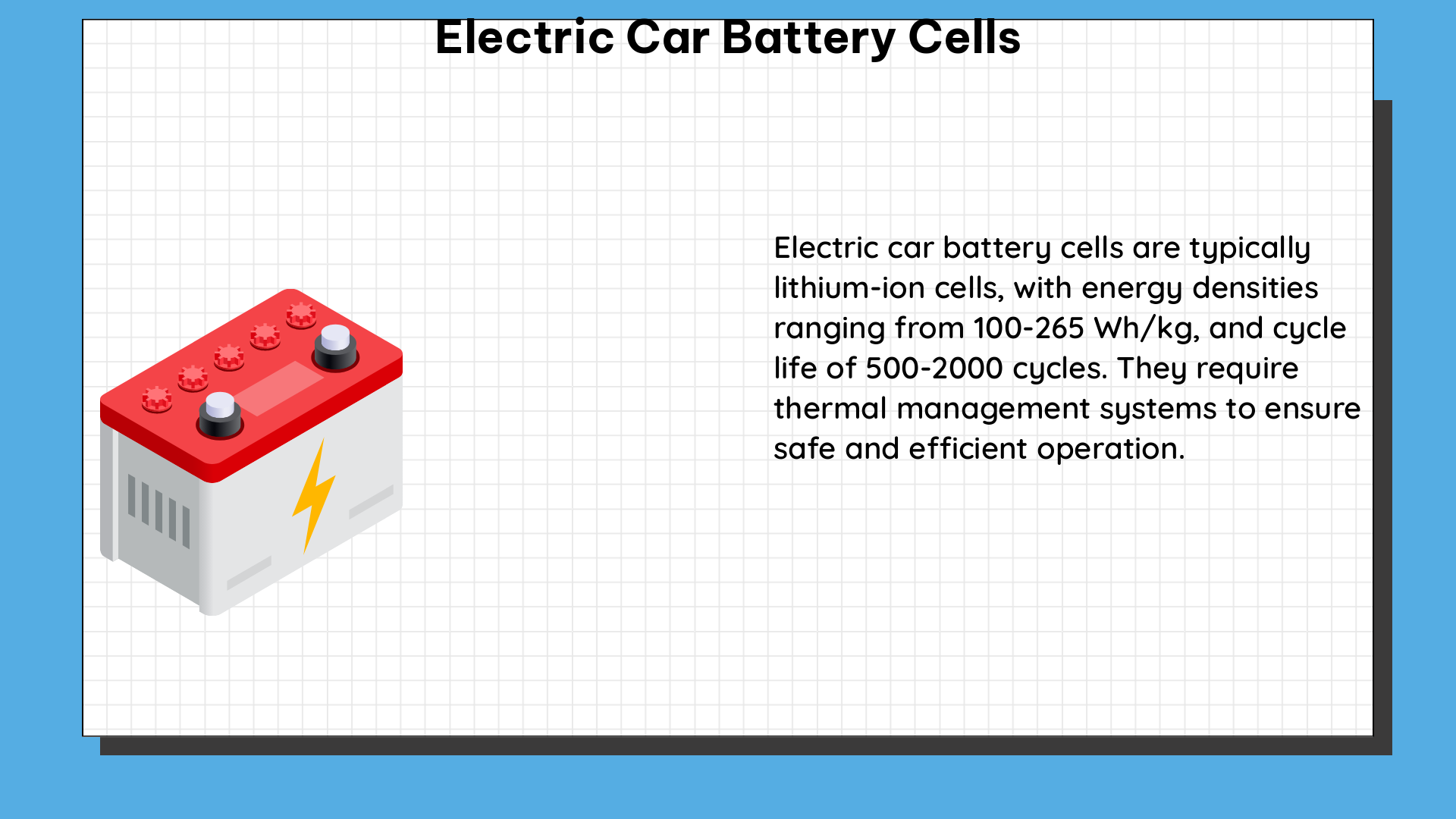Electric car battery cells are the heart of electric vehicles (EVs), powering their performance, range, and efficiency. These advanced energy storage systems are engineered to deliver exceptional power, capacity, and durability, making them a crucial component in the transition to a sustainable transportation future.
Technical Specifications of Electric Car Battery Cells
The technical specifications of electric car battery cells are the foundation upon which their performance is built. These include:
Voltage
The voltage of electric car battery cells typically ranges from 3.2V to 4.2V for lithium-ion (Li-ion) batteries, and 1.2V to 1.5V for nickel-metal hydride (NiMH) batteries. The choice of voltage depends on the specific battery chemistry and the requirements of the EV’s powertrain.
Capacity
The capacity of electric car battery cells is measured in ampere-hours (Ah) and determines the amount of energy the battery can store. Commonly, EV battery packs are composed of cells with capacities ranging from 20Ah to 60Ah, with higher-capacity cells being used in longer-range vehicles.
Energy Density
Energy density, measured in watt-hours per kilogram (Wh/kg), is a crucial metric that reflects the amount of energy a battery cell can store per unit of weight. Modern Li-ion battery cells can achieve energy densities of 200-300 Wh/kg, while solid-state battery cells are expected to reach up to 500 Wh/kg in the near future.
Power Density
Power density, measured in watts per kilogram (W/kg), determines the rate at which a battery cell can deliver or absorb power. High-performance EV battery cells can achieve power densities of 1,000-2,000 W/kg, enabling rapid acceleration and efficient regenerative braking.
Charging Time
The charging time of electric car battery cells is a critical factor for user convenience. Li-ion battery cells can typically be charged from 0% to 80% in 30-60 minutes using fast-charging infrastructure, while slower Level 1 and Level 2 charging can take several hours to fully replenish the battery.
Comprehensive Battery Cell Testing

Ensuring the reliability and safety of electric car battery cells is a top priority for manufacturers and researchers. Comprehensive testing regimes are employed to evaluate the performance, durability, and safety of these energy storage systems.
Open Circuit Voltage (OCV) Testing
OCV testing measures the voltage of a battery cell when it is not under load, providing insights into the state of charge and overall health of the cell.
Resistance Measurements
Resistance measurements, such as those for battery tab and busbar welds, help identify potential issues with electrical connections and ensure optimal power delivery.
Temperature Monitoring
Environmental and safety testing using temperature datalogging helps evaluate the battery cell’s thermal management and response to extreme conditions.
Self-Discharge Quantification
Measuring the battery cell’s self-discharge rate, or the gradual loss of charge when not in use, helps determine the cell’s long-term storage capabilities.
Formation, Aging, and Cycling
Battery cells undergo formation, aging, and cycling tests to assess their capacity retention, power delivery, and overall lifespan under various operating conditions.
Internal Resistance Measurements
DC internal resistance testing helps evaluate the battery cell’s quality and identify potential issues with the electrode contact and internal structure.
Insulation Resistance
Measuring the insulation resistance between the battery cell’s terminals and its casing ensures the cell is properly isolated, enhancing safety and preventing potential short circuits.
Battery Degradation and Lifespan
Electric car battery cells are subject to degradation over time, which can be influenced by various factors, including usage patterns, environmental conditions, and storage methods.
Non-Linear Degradation
Battery health does not degrade in a straight line. There can be a short but dramatic decline in health right out of the gate due to the formation of the protective solid electrolyte interphase (SEI) layer. After this initial decline, the degradation levels off and decreases slowly and linearly.
Degradation Rates
The rate of battery degradation can vary depending on the type of battery cell used. Some Li-ion battery cells are designed to last over 1,000 cycles, while other chemistries may degrade more quickly.
Factors Affecting Degradation
Factors such as high temperatures, frequent fast charging, and deep discharge cycles can accelerate the degradation of electric car battery cells. Proper battery management and charging strategies can help mitigate these effects and extend the battery’s lifespan.
Conclusion
Electric car battery cells are the backbone of modern electric vehicles, providing the power, range, and efficiency that are driving the transition to sustainable transportation. By understanding the technical specifications, comprehensive testing procedures, and degradation patterns of these advanced energy storage systems, engineers, researchers, and EV owners can work together to unlock the full potential of electric mobility.
References:
- EV Battery Testing | Tektronix. (n.d.). Retrieved May 27, 2024, from https://www.tek.com/en/solutions/industry/automotive-test-solutions/ev-battery-testing
- EV Battery Health after 250 Million Electric Car Miles – Recurrent. (2023, May 17). Retrieved May 27, 2024, from https://www.recurrentauto.com/research/lessons-in-electric-car-battery-health
- Zhao, J., & Burke, A. F. (2022). Electric Vehicle Batteries: Status and Perspectives of Data-Driven Diagnosis and Prognosis. Batteries, 8(10), 142. doi:10.3390/batteries8100142
- Data-driven prediction of battery failure for electric vehicles – PMC. (2022, April 15). Retrieved May 27, 2024, from https://www.ncbi.nlm.nih.gov/pmc/articles/PMC9010759/
- Wassiliadis, N., Steinsträter, M., Schreiber, M., Rosner, M., Nicoletti, L., Schmid, F., Ank, M., Teichert, O., Wildfeuer, O., Koch, J., König, A., Glatz, A., Gandlgruber, A., Kröger, J., Lin, T., & Lienkamp, M. (2022). Quantifying the state of the art of electric powertrains in battery electric vehicles: Range, efficiency, and lifetime from component to system level of the Volkswagen ID.3. Journal of Power Sources, 528, 230516. doi:10.1016/j.jpowsour.2022.230516

The lambdageeks.com Core SME Team is a group of experienced subject matter experts from diverse scientific and technical fields including Physics, Chemistry, Technology,Electronics & Electrical Engineering, Automotive, Mechanical Engineering. Our team collaborates to create high-quality, well-researched articles on a wide range of science and technology topics for the lambdageeks.com website.
All Our Senior SME are having more than 7 Years of experience in the respective fields . They are either Working Industry Professionals or assocaited With different Universities. Refer Our Authors Page to get to know About our Core SMEs.